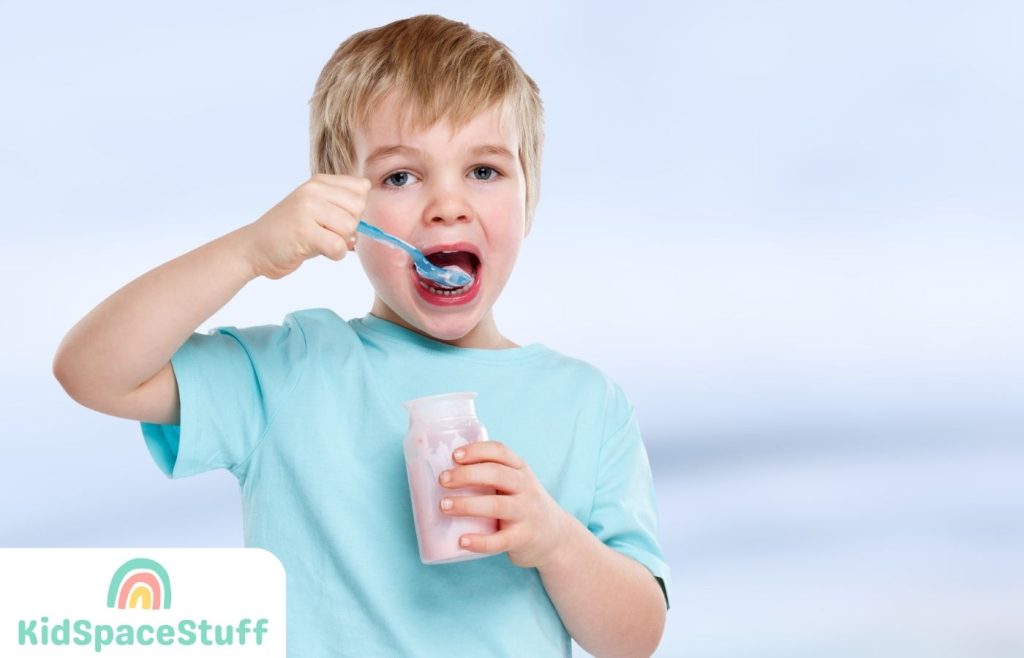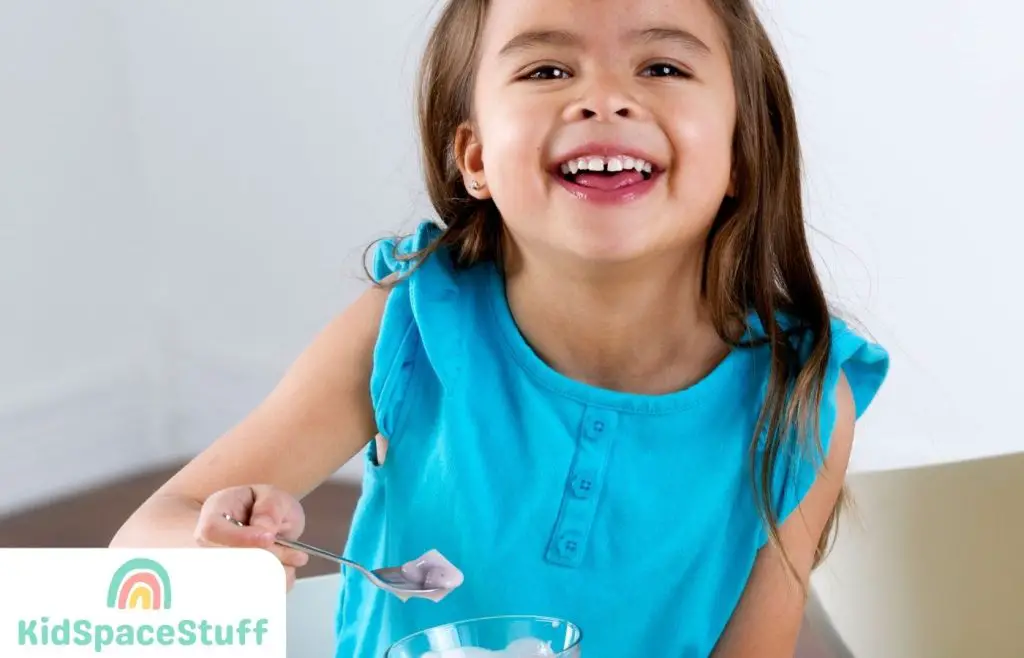Activia, a popular brand of probiotic yogurt, is often hailed for its potential benefits to digestive health.
But, can kids reap these benefits too? Is it safe for them to consume Activia?
In this article, I’ll spoon through the specifics, examining Activia’s nutritional profile, potential health impacts, and whether it’s suitable for children. So, whether you’re a parent considering new dietary options or simply curious, join us as we unravel the details about kids and Activia.
Can Kids Have Activia?

Activia is a popular yogurt brand that contains probiotics, which are known to promote good gut health. As parents, we may wonder if it’s safe for our kids to consume Activia. Let us briefly discuss whether children, especially those under the age of 5, can have Activia.
First of all, it’s important to understand that probiotics are live bacteria that naturally exist in the human gut.
The World Health Organization suggests that probiotics can improve digestive function, which is beneficial for people of all ages, including children. However, it’s always advisable to consult a doctor before introducing new food items to kids’ diets, especially if they have any health issues or allergies.
Now, coming to Activia, there are studies that have examined the effect of probiotic yogurt on children’s constipation. The results suggest that the potential benefits of Activia may not be significant for addressing chronic constipation in children.
While Activia can be a healthy addition to a balanced diet, it is worth noting that some Activia products, such as Activia Light, contain a nonnutritive sweetener called sucralose. There are conflicting opinions about the effect of sucralose on the digestive system, so it’s a good idea to read the ingredients before purchasing the product for your kids.
To sum it up, giving Activia to kids may be fine, but it’s essential to maintain a balanced diet and consult a healthcare provider if your child has any specific health concerns. Remember, moderation and variety are crucial when providing nourishment for our little ones.
Check out this guide to understand if kids can have Boost!
Health Benefits of Activia for Kids
As parents, we always want to make sure our children are getting the best nutrition possible. One food product that comes to mind for promoting digestive health is Activia yogurt. Children can benefit from incorporating Activia into their diets, with moderation and guidance.
Probiotics in Activia
Activia yogurt contains probiotics, specifically the Lactobacillus strain, which is known to help support the digestive system. Probiotics are live bacteria that can provide several benefits for our kids, such as helping alleviate gas, bloating, and diarrhea. Additionally, probiotics can help boost the immune system, keeping our little ones healthier.
Another important aspect of Activia is the presence of prebiotics. Prebiotics are essentially food for probiotics, ensuring that the healthy bacteria in the digestive system have an ample supply of nutrients to thrive. This, in turn, promotes proper digestion and better overall gastrointestinal health.
However, it’s important to remember that not all kids may have the same experience with Activia. Some children might not see significant improvements in their digestive health, while others may find it helpful in managing their symptoms. But, being cautious about the portion and frequency of consumption is essential, as too much yogurt might cause more harm than good.
As parents, our focus should be on ensuring that our children have a well-balanced and nutritious diet, which includes a variety of foods from different groups. Including probiotic-rich options like Activia can be a great addition, but it’s important not to rely solely on these products for our child’s digestive health.
Always consult a healthcare professional or pediatrician before introducing new foods, like Activia, into your child’s diet to ensure it’s the right choice for their unique nutritional needs.
Ingredients in Activia
Activia contains several essential ingredients, including cultured grade A reduced-fat milk, sugar, water, and fructose or fruit sugar. These components provide a base for the smooth and creamy texture we all enjoy. Moreover, Activia has a few additional ingredients that contribute to its consistency and nutritional value. These include modified food starch, less than 1 percent milk protein concentrate, modified corn starch, kosher gelatin, agar, and guar gum. Additionally, the yogurt contains lactic acid, calcium lactate, vitamin D3, and sodium citrate, which help improve the overall taste and nutrition profile.
Now, let’s talk about the star ingredient in Activia, which is Bifidobacterium lactis, a probiotic found exclusively in this yogurt. Probiotics are beneficial bacteria that promote gut health and can alleviate minor digestive discomforts such as gas, bloating, and rumbling. This is one of the features that set Activia apart from other yogurts, as it contains a unique strain that supports digestive health.
Activia also comes in a variety of flavors, ranging from cherry, prune, and mixed berry to strawberry banana, peach, and vanilla. This wide selection of flavors ensures there’s something for everyone in the family, making it a delightful and healthy option for both kids and adults.
In summary, the ingredients in Activia yogurt are thoughtfully chosen to provide a deliciously creamy texture while promoting digestive health.
Possible Side Effects for Kids

Hey, we wanted to talk about the possible side effects kids might experience when having Activia yogurt. While it’s generally seen as a healthy product, it’s essential to know how it may impact little ones.
First off, some kids might experience abdominal discomfort when they eat Activia. This can include things like gas, bloating, and rumbling. We found a source that recommends consuming the yogurt product twice a day for two weeks, but keep in mind that the tolerance may vary for each child.
Calcium and vitamin D are essential nutrients for kids, and they can be found in Activia. However, if a child consumes too much calcium or vitamin D from various sources, it might lead to side effects like nausea or kidney issues. So, be aware of the quantity they’re consuming and balance it with other foods.
Now, we know that Activia is potentially helpful for people with irritable bowel syndrome (IBS) due to its probiotic content. But it’s not clear if the same benefits apply to kids, and they might still experience some side effects related to their gut flora. Also, the right dose to achieve the desired results may not be the same as for adults, so watch out for any negative reactions while they’re trying this yogurt.
Lastly, while treatment with probiotics can improve gut health, it’s crucial to not rely solely on Activia or any specific product. Consulting with a pediatrician or nutritionist is a smart move to ensure kids are getting the right balance of nutrients and treatment for their unique needs.
Here’s a great video explaining what probiotics are!
Alternatives to Activia for Kids
If you’re looking for alternatives to Activia that provide similar benefits for your kids, there are several options to consider. Some of these options contain good bacteria that can help enrich your child’s microbiota and contribute to their overall gut health.
Kefir is a popular probiotic-rich beverage made by fermenting milk with kefir grains. We love kefir not only for its tangy flavor but also because it can provide a source of beneficial bacteria, such as Lactobacillus rhamnosus GG, that are great for improving gut health. Plus, kefir is versatile – you can use it in smoothies, pour it on cereal, or even swap it in for milk or yogurt in recipes.
Inulin is a type of soluble fiber that serves as food for the good bacteria in our gut. It can be found in many foods, such as chicory root, bananas, and garlic. Including these foods in your child’s diet can help promote the growth of good bacteria in their digestive system.
For babies, breast milk is an excellent source of beneficial bacteria. Not only does it provide essential nutrients and antibodies, but it also helps stimulate the growth of good bacteria in the baby’s gut, promoting a healthy microbiota.
Another probiotic alternative is the yeast Saccharomyces boulardii. This beneficial yeast is commonly found in probiotic supplements and can help support a healthy gut balance. Keep in mind that probiotics for kids should be age-appropriate, so always check the label and consult your pediatrician before giving a supplement to your child.
Eczema is a common condition among children, and studies have shown that certain strains of bacteria, such as Lactobacillus rhamnosus GG, may help reduce eczema symptoms. To include Lactobacillus rhamnosus GG in your child’s diet, look for probiotic yogurts or supplements that contain this specific strain.
In conclusion, while Activia is a well-known probiotic product, there are plenty of alternatives that can provide similar benefits for your kids. Consider incorporating kefir, inulin-rich foods, and other probiotic-rich products into their diet to support their gut health and overall well-being just like whey protein and protein bars.
Frequently Asked Questions
Is Activia safe for young children?
Yes, Activia is generally safe for young children. It is a yogurt product that contains probiotics, which promote digestive health. However, it is always a good idea to consult with your child’s pediatrician before introducing new foods, especially if they have any health concerns or food allergies.
What age is appropriate to start eating Activia?
There is no specific age when kids can start eating Activia, as it depends on each child’s individual development and dietary needs. However, it is generally recommended that yogurt be introduced to infants after they have started eating solid foods, typically around 6 months of age. Again, consult with your child’s pediatrician for personalized advice.
Are there any risks for kids eating Activia?
Some children may experience mild digestive issues, such as gas or bloating, when consuming Activia or other probiotic-rich foods. These side effects are typically temporary and may improve as the child’s digestive system becomes accustomed to the probiotics. If your child experiences any severe or persistent symptoms, discontinue the use of Activia and consult with their pediatrician.
How do Activia’s probiotics compare to regular yogurt?
Activia contains a specific strain of probiotic bacteria, called Bifidobacterium lactis DN-173 010, also known as Bifidus Regularis, which is not found in all regular yogurts. This probiotic strain is said to help improve gut health and promote regularity. Regular yogurt may also contain probiotics, but the strains and amounts can vary greatly between brands and products.
What are the benefits of children consuming Activia?
Activia can offer several benefits for children, including supporting digestive health and contributing to a well-balanced gut microbiome. This may help improve regularity and overall well-being. Additionally, like other yogurt products, Activia is a good source of calcium, protein, and vitamins, making it a nutritious addition to children’s diets.
When should kids consume Activia for best results?
There is no specific time of day that is best for kids to consume Activia, as long as it is incorporated into a balanced diet. You might consider offering Activia as part of a healthy breakfast, after-school snack, or dessert option. It is important to ensure your child’s daily intake remains nutritionally balanced and does not over-rely on any single food item.
Final Thoughts
To sum up, Activia can be part of a balanced diet for children, thanks to its probiotics and nutritional value. However, it’s important to pay attention to portion sizes and the sugar content.
As with any changes in your child’s diet, consulting with a healthcare professional or nutritionist is advised. By making informed dietary choices, we can support our kids’ health and well-being, one spoonful at a time.
KidSpaceStuff is a site dedicated to helping parents find the best interior design, activities, and inspiration for their kids.